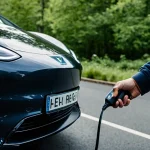Overview of Vehicle Connectivity in the UK Automotive Industry
Vehicle connectivity is revolutionizing the UK automotive industry by enabling seamless communication and interaction between vehicles and external systems. This transformative shift is largely driven by technological advancements, which have become vital in meeting the modern demands of consumer expectations. Buyers now expect vehicles that offer real-time navigation, remote diagnostics, and entertainment systems that integrate smoothly with their digital lives.
Currently, the UK automotive market is embracing this shift with increasing vigor, as manufacturers integrate advanced technologies to keep pace with global innovations. This integration ensures vehicles are not just modes of transport, but connected environments offering enhanced safety, efficiency, and convenience.
Also to see : What are the consumer trends driving change in the UK car market?
Consumers in the UK are increasingly favoring vehicles that exhibit a high degree of connectivity. This expectation has fueled demand for vehicles capable of integrating with mobile devices, providing real-time traffic updates, and offering internet-powered infotainment solutions. As such, vehicle connectivity has become a significant competitive factor, prompting manufacturers to prioritize the development and implementation of these technologies.
Understanding the importance of vehicle connectivity allows industry stakeholders to make informed decisions and adapt to the evolving demands of technological advancements in the UK automotive industry. As connectivity continues to shape consumer preferences, its significance in driving the future of mobility cannot be overstated.
Also read : What Are the Most Common Problems Faced by Electric Vehicle Owners?
Software Development Strategies Among UK Car Manufacturers
In the UK automotive industry, crafting efficient software development strategies is pivotal for enhancing in-car systems and providing a seamless user experience. The process begins with developing proprietary software tailored to a vehicle’s specific functionalities. This approach ensures bespoke solutions, allowing manufacturers to fine-tune features that resonate with consumer needs and expectations.
Enhancements in user interfaces have revolutionized how drivers interact with their vehicles. Regular software updates bring improvements, such as better navigation tools, enhanced safety alerts, and voice-activated controls. These updates not only refine user experience but also keep vehicles equipped with the latest technological advancements.
Examples of innovative manufacturers include Jaguar Land Rover and Nissan, who excel in software innovation by integrating advanced systems. Their commitment to improving user experience through cutting-edge technology exemplifies the growing trend of software as a key differentiator among top brands in the UK automotive industry.
Integration of IoT Technologies in UK Vehicles
The integration of IoT technologies in UK vehicles is revolutionising the way smart vehicles operate, driving unparalleled advancements in vehicle communication and functionality. At the heart of this transformation is the ability of vehicles to engage in real-time data collection and exchange, significantly enhancing both performance and safety. IoT enables vehicles to connect with various networks and systems, facilitating improved diagnostics, maintenance alerts, and dynamic interaction with traffic systems, which results in smarter navigation and energy efficiency.
In terms of data analysis, IoT allows manufacturers and drivers to glean insights from the vast amount of information generated by connected vehicles. This data is crucial for refining vehicle designs, optimising driving behavior, and even reducing risks by alerting drivers to potential hazards. Data collection, when combined with predictive analytics, has led to sophisticated features like maintenance reminders and safety warnings designed to prevent breakdowns and accidents before they occur.
Prominent UK manufacturers have embraced IoT technologies with notable success. For instance, Ford UK has incorporated extensive IoT solutions in its latest models, offering advanced vehicle health monitoring and seamless smartphone integration. Similarly, Bentley Motors utilises IoT for bespoke customisation services that cater to individual driver preferences, enhancing the customer experience.
These case studies highlight the profound impact of IoT on the UK automotive sector; smart vehicles equipped with IoT deliver an enhanced driving experience while setting new benchmarks for innovation and connectivity. The journey of IoT in vehicles continues to hold significant promise, heralded by ongoing advancements and increasing consumer interest in smart, connected experiences on the road.
Adoption of 5G Technology for Enhanced Connectivity
The rollout of 5G technology is set to redefine vehicle connectivity within the UK automotive industry. 5G promises to unlock exceptional levels of mobile network efficiency, enhancing real-time data exchange capabilities between connected vehicles and external infrastructures. This technology’s low latency and high-speed data transmission support seamless vehicle-to-vehicle (V2V) and vehicle-to-everything (V2X) communications, thereby transforming driver experiences and boosting vehicle performance.
Revolutionizing Driver Experience
By enabling ultra-fast data transfer speeds, 5G enhances in-car entertainment systems, navigation accuracy, and diagnostic functionalities. Drivers can benefit from real-time navigation updates and rapid access to cloud-based applications, significantly improving user experience and road safety. The high-capacity networks of 5G also support augmented reality (AR) and virtual assistance tools, providing comprehensive driver assistance systems.
Challenging Implementation
Despite its benefits, implementing 5G across UK cars presents challenges, particularly in infrastructure development and interoperability with existing technologies. The need for widespread 5G network coverage and investment in compatible hardware and software are primary hurdles. However, proactive strategies by manufacturers, such as collaboration with telecom providers and gradual integration of 5G capabilities, offer promising pathways to overcome these obstacles.
Opportunities for Innovation
The shift towards 5G opens new horizons for innovation as automakers explore advanced features like autonomous driving and predictive maintenance analytics. The reduced latency and enhanced connectivity powered by 5G are vital for developing these sophisticated systems, paving the way for futuristic mobility solutions. In essence, 5G technology stands as a cornerstone in the ongoing evolution of smart vehicles, redefining connectivity standards and promising enhanced experiences for both drivers and passengers.
Collaborations with Technology Companies
In the UK automotive industry, tech partnerships play a crucial role in driving vehicle innovation and enhancing connectivity. Notable collaborations between car manufacturers and technology firms have significantly impacted vehicle functionality and features, resulting in smarter and more integrated automotive solutions.
Impact of Tech Partnerships
These collaborations have allowed car manufacturers to leverage cutting-edge technologies, ensuring vehicles are equipped with the latest advancements. For instance, partnerships with tech giants have facilitated the incorporation of augmented reality interfaces, enhanced connectivity solutions, and improved in-car entertainment systems. Such innovations not only boost the vehicle’s appeal but also enhance the overall user experience, making driving more intuitive and enjoyable.
Future Trends in Automotive-Tech Collaborations
Looking ahead, the future of automotive-tech collaborations promises even more groundbreaking advancements. Manufacturers are increasingly focusing on integrating artificial intelligence and machine learning to create personalized and adaptive driving experiences. Additionally, further development in autonomous driving technology stands to benefit greatly from these collaborations, as tech firms provide the expertise needed to advance these complex systems.
By partnering with technology companies, UK car manufacturers are setting new standards in vehicle connectivity and paving the way for a future where vehicles are more than just transportation. They are evolving into intelligent companions that cater to the evolving needs and expectations of modern consumers.
Case Studies of Leading UK Car Manufacturers
The UK automotive industry showcases several leading car manufacturers that stand out for their excellence in enhancing vehicle connectivity. These case studies provide valuable insights into the best practices employed by top brands, setting benchmarks for innovation in this evolving sector.
In-depth Look at Top UK Manufacturers
Prominent manufacturers such as Jaguar Land Rover and Bentley have taken significant strides in connectivity. Jaguar Land Rover’s commitment to developing in-house software solutions has resulted in seamless user experiences, from advanced navigation systems to cutting-edge safety features. Meanwhile, Bentley’s bespoke customisation services enable vehicles to cater to individual preferences, showcasing the brand’s focus on creating a tailored driving experience.
Comparisons of Connectivity Features Among Different Brands
When comparing connectivity features, it’s evident that each brand brings unique offerings to the table. For example, Ford UK provides robust IoT integrations for comprehensive vehicle health monitoring, while Nissan excels with their user-friendly in-car systems that enhance both convenience and safety. Such differences highlight the diverse approaches to connectivity, catering to varying consumer needs.
Lessons Learned from the Strategies Employed by Each Manufacturer
These manufacturers offer key lessons in driving connectivity innovation. Firstly, prioritising user-centric design in software developments is crucial for enriching the driving experience. Secondly, leveraging partnerships with technology companies enables access to cutting-edge solutions, effectively accelerating advancements. These strategic practices pave the way for automotive excellence, ensuring that UK car manufacturers remain at the forefront of the global automotive landscape.
Market Trends and Future Implications
The evolution of vehicle connectivity in the UK automotive industry is shaped by several dynamic market trends that are poised to redefine the landscape. As consumers increasingly demand more advanced technological features, manufacturers are focusing on integrating cutting-edge solutions to meet these expectations and stay competitive.
Key Trends Shaping the Future
Among the most prominent trends is the growing emphasis on real-time data integration, which allows vehicles to seamlessly interact with their environment, enhancing both performance and safety. The drive for sustainability is also encouraging manufacturers to develop more energy-efficient systems that align with eco-conscious consumer values.
Predictions for Future Advancements
Technological advancements such as autonomous driving and enhanced vehicle-to-everything (V2X) communication are anticipated to play crucial roles in future developments. These innovations promise to elevate user experiences, offering new levels of convenience and customization. Additionally, the expansion of 5G networks is expected to facilitate these advancements, enabling ultra-fast connectivity and reliable communications.
Influence of Consumer Feedback
Consumer feedback is pivotal in tailoring connectivity offerings to align with user preferences and needs. Manufacturers are increasingly employing data-driven approaches to understand consumer behavior and expectations, ensuring that their innovations resonate well with the market demand. By leveraging insights from consumer experiences, the automotive industry can better anticipate and fulfill the demand for sophisticated, connected vehicles.
Through adaptation to these market trends and continuous innovation, the UK automotive sector remains at the forefront of technological progress, heralding an exciting future for vehicle connectivity.



